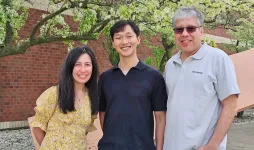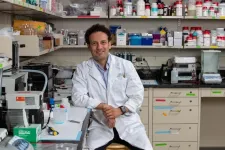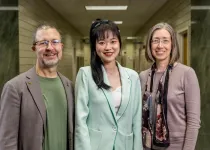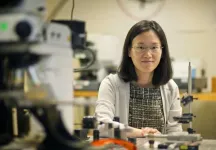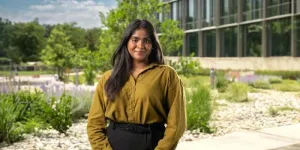(Press-News.org) As the world faces the loss of a staggering number of species of animals and plants to endangerment and extinction, one University of Michigan scientist has an urgent message: Chemists and pharmacists should be key players in species conservation efforts.
"Medicinal chemistry expertise is desperately needed on the frontlines of extinction," said Timothy Cernak, assistant professor of medicinal chemistry at the U-M College of Pharmacy. "Animals are dying at staggering rates, but they don't have to. Modern bioscience has achieved enormous breakthroughs in treating disease in humans, and the same medications, and the science behind them, can be applied in the wild."
Local and global efforts to reduce environmental damage are underway, but they are too slow to save the many ailing populations in the wild, he said.
"We are in the middle of a mass extinction. We are chasing mass die-offs around the world. Lowland gorillas, Argentinian penguins, the akikiki bird in Hawaii, loggerhead turtles in Florida. The list goes on, and many precious plants are also hanging by a thread," he said. "So it's critical to bring the power of modern pharmaceuticals and the dosing expertise of medicinal chemistry into conservation efforts."
Cernak and a team of young scientists, including a local high school student, make the case for establishing and nurturing the emerging field of conservation medicine in a research article published this week in the Journal of Medicinal Chemistry.
"It's hard-core science. It's bringing the lens of medicinal chemistry and modern pharmaceuticals into the conversation to save other species," Cernak said. "Drivers of the current mass extinction include habitat loss, global warming and overharvesting, but one specific root cause—wildlife disease—seems ripe for intervention. Medicinal chemistry is that intervention."
Cernak, in one of many roles and research projects, receives samples of dead and ailing species from around the world. Using the same methods and models used to find compounds that work against human disease, his lab at U-M, which recently brought a veterinarian on board, tests chemical compounds on samples to see which ones respond to disease-causing organisms. A major focus is fungus, the single-largest killer of amphibians.
In their paper, the authors propose a new role for chemistry and pharmacy on the frontlines of preventing extinction: "A long-term solution to mass extinction is to fix climate change and habitat loss using new technologies and new policies. As a bandage for the short term, chemistry in service of endangered species is needed.
"Medicinal chemists interested in preventing extinction are encouraged to talk to zookeepers, foresters, veterinarians, entomologists, wildlife rehabilitators and conservationists to learn about the challenges and solutions where conservation medicine could make an impact, and to share their wisdom from the frontlines of drug discovery."
Cernak is pushing for a new, impactful field of science.
"At the higher level, my mission is to have pharmaceutical companies be involved in this space and young scientists view this as the field they want to go into—a field that doesn't really exist at this point," he said. "A more immediate goal is fundraising and more research as the field and the value of the field is established."
From deadly fungus decimating Panamanian golden frogs, cancerous tumors killing loggerhead turtles and the numerous pests and illnesses sickening plants such as the hemlock tree, there is no shortage of challenges for conservation medicine to tackle.
One of those challenges may be preventing a disease from threatening public health.
"In January, 96% of sea lion pups in Argentina died in January from avian flu. If it reaches humans, what are we going to do?" Cernak said. "There may be just five akikiki songbirds left in the wild. They are dying from malaria and pox, diseases that can be treated in humans."
Studying wildlife diseases could also provide critical insights to medicinal chemists focused on human health, he said, and possibly a new paradigm where drug development and dosing prediction models, which are currently trained heavily on pharmacokinetics in rodents, could be diversified.
"The problem is that too often, conservationists who are trying desperately to treat and save dwindling populations aren't equipped with the latest pharmaceutical science and tools," he said. "Given current knowledge gaps, they may not know which drug will work best or what the right dosage might be for an endangered species."
Bringing chemists and pharmacists into the conservation fold isn't meant to diminish veterinarians and conservation groups, but to blend their experience and expertise and achieve the same goals of saving lives—and the ecosystem, Cernak said.
"Modern medicine could prevent the extinction of endangered species. Wildlife disease is a major driver of the current mass extinction yet therapeutic intervention in nonhuman species remains poorly understood," he said. "In zoos, botanical gardens and animal rehabilitation centers, many diseases are treatable, but the understanding of medicine for endangered species lags far behind our current understanding of human medicine."
At this moment, Cernak's lab is not only researching faster, safer pharmaceutical development for humans but also testing the Panamanian golden frogs afflicted with a fungus that threatens their existence.
Cernak supports the Centers for Disease Control and Prevention's concept of One Health, which recognizes the connection between the health of people, animals and the environment.
"We look at plants and animals the same," he said. "The concept of One Health Pharmacy—plants, humans and animals—is we treat any that are sick or in need."
Cernak's lab has advanced the use of artificial intelligence and other technology in speeding up the process of drug discovery. He said that only increases the opportunities to help animals and plants sooner than later.
"Streamlining drug and agrochemical discovery with automation and artificial intelligence is likely to usher in a future era of accelerated medicinal invention tailored to specific patient populations," Cernak and team wrote in their paper.
"While it may still be decades away, one can imagine a future where it is possible to feed a chatbot prompts like, 'Invent a single-dose antiviral for elephant endotheliotropic herpesvirus with optimal pharmacokinetic properties for Asian elephants.' Exciting applications of medicinal chemistry on threatened and endangered species are beginning to offer hope."
Cernak's co-authors include: Tesko Chaganti, a student at Canton High School, Canton, Michigan; Chun-Yi Tsai, a graduate student in U-M's Department of Chemistry; Yu-Pu Juang, a postdoctoral researcher in the Cernak Lab; and Mohamed Abdelalim, a visiting research investigator at U-M.
Study: Medicinal Chemistry Gone Wild (DOI: 10.1021/acs.jmedchem.3c02334)
END
Missing link in species conservation: Pharmacists, chemists could turn tide on plant, animal extinction
2024-04-30
ELSE PRESS RELEASES FROM THIS DATE:
Illinois researchers develop an AI model to reduce uncertainty in evapotranspiration prediction
2024-04-30
URBANA, Ill. – When scientists look at the Earth’s available water for ecosystem services, they don’t just look at precipitation. They must also account for water moving from the ground to the atmosphere, a process known as evapotranspiration (ET). ET includes evaporation from soil and open water pools such as lakes, rivers, and ponds, as well as transpiration from plant leaves. The difference between precipitation and ET indicates the water balance available for societal needs, including agricultural and industrial production. However, measuring ET is challenging. A new study from the University of Illinois Urbana-Champaign ...
Is it time to retire the best-before date?
2024-04-30
The inventors of a suite of tests that enable food packages to signal if their contents are contaminated are working to bring producers and regulators together to get their inventions into commercial products, with the goal of preventing illness and reducing food waste.
Though the tests would cost just a few cents per package, food producers are reluctant to add costs that consumers will ultimately have to bear, say the McMaster researchers behind an article published today in the journal Nature Reviews Bioengineering.
A system based on smart packaging, the researchers say, would save producers ...
An electrifying discovery may help doctors deliver more effective gene therapies
2024-04-30
MADISON — In an effort to improve delivery of costly medical treatments, a team of researchers in electrical engineering at the University of Wisconsin–Madison has developed a stimulating method that could make the human body more receptive to certain gene therapies.
The researchers exposed liver cells to short electric pulses — and those gentle zaps caused the liver cells to take in more than 40 times the amount of gene therapy material compared to cells that were not exposed to pulsed electric fields. The method could help reduce the dosage needed for these treatments, making them much safer and more affordable. The research appears April 30 in the ...
Lurie Children’s Hospital first-in-pediatrics to use technology that lights up lung cancer during surgery
2024-04-30
Ann & Robert H. Lurie Children’s Hospital of Chicago is pleased to announce the first pediatric use of the novel fluorescent agent CYTALUX during surgery to remove lung metastases. The drug allows surgeons to better visualize cancer in the lung, as well as potentially detect additional cancerous nodules missed by preoperative imaging. This drug is FDA-approved in adult patients, but Lurie Children’s is the first-in-pediatrics to have an Investigational New Drug application with the FDA to study ...
$3.6 million to advance nuclear energy awarded to U-M
2024-04-30
Four U-M projects funded by the Department of Energy's Nuclear Energy University Partnerships program aim to make nuclear energy safer and more equitable.
The projects are designed to improve the monitoring of nuclear reactors during operation; explore the safety of an advanced modular reactor design; develop a framework for ethical, consent-based siting of nuclear facilities; and upgrade a facility for modeling radiation damage to reactor components.
Real-time radiation effects on optics
How well could optical sensors monitor future advanced nuclear reactors? Funded with $1 million, Igor Jovanovic, a professor of nuclear ...
Two UT Arlington faculty honored for outstanding research
2024-04-30
The University of Texas at Arlington is honoring two faculty for their outstanding contributions to research.
Yuze (Alice) Sun, associate professor of electrical engineering, and Venu Varanasi, associate professor in the Bone Muscle Research Center, are the 2024 recipients of the University Award for Outstanding Research Achievement or Creative Accomplishment. This award recognizes faculty members for achieving significant research or creative accomplishments during the past three years.
“Alice and Venu are truly bright stars on the faculty at UT Arlington,” ...
UT Arlington student links worm behavior to brain disease
2024-04-30
As an undergraduate student in The University of Texas at Arlington’s Honors College, Hannah Selvarathinam knew she wanted to conduct research. Near the end of her first year at UTA, the Keller native reached out to the lab of biology Assistant Professor Piya Ghose.
“Hannah has been a very impressive scholar from Day 1,” Ghose said. “She had the foresight to reach out for research opportunities very early on.”
Ghose brought Selvarathinam in to work on one of the lab’s core projects ...
Uncovering the secret of long-lived stem cells
2024-04-30
Nothing lives forever, but compared to other cells in the body, hematopoietic stem cells (HSCs) are remarkably long-lived. HSCs are blood-forming cells – they give rise to rapidly dividing progenitor cells, which in turn generate hundreds of billions of cells to fulfill the daily demand of oxygen-delivering red blood cells, disease-fighting white blood cells and clot-forming platelets.
HSCs typically remain dormant within the bone marrow, yet they possess the ability to activate and replenish blood cells continuously, maintaining a relatively youthful profile throughout the life of an organism. What is the secret of ...
The question for online educational platforms: offer courses following a schedule or release them on demand?
2024-04-30
Researchers from Carnegie Mellon University and University of Pennsylvania published a new Journal of Marketing study that examines online educational platforms and the question of whether they should release content through a scheduled format that resembles a traditional university course or use an on-demand release strategy.
The study, forthcoming in Journal of Marketing, is titled “More Likely to Pay but Less Engaged: The Effects of Switching Online Courses from Scheduled to On-Demand Release on User Behavior” and ...
Study: racial bias is no 'false alarm' in policing
2024-04-30
Black drivers are more frequently searched during traffic stops without finding contraband than white drivers, according to a University of Michigan study.
Institute for Social Research scientists Maggie Meyer and Richard Gonzalez analyzed data from 98 million traffic stops, and showed that innocent Black drivers were likely to be searched about 3.4 to 4.5 percent of the time while innocent white drivers were likely to be searched about 1.9 to 2.7 percent of the time. Their results are published in the Journal of Quantitative Criminology.
"We show that there's ...
